Related Research Articles

The Australia national rugby union team, nicknamed the Wallabies, is the representative national team in the sport of rugby union for the nation of Australia. The team first played at Sydney in 1899, winning their first test match against the touring British Isles team.
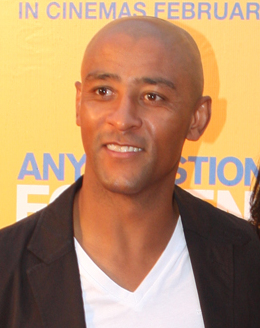
George Musarurwa Gregan AM is a retired Australian rugby union player, and is currently Australia's most capped international player.
Mark Gordon Ella, AM is an indigenous Australian former rugby union footballer. Ella played at flyhalf/five-eighth and was capped by the Wallabies 25 times, captaining Australia on 10 occasions.
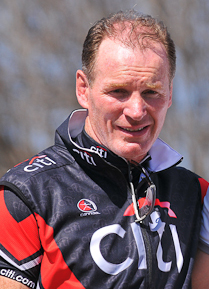
Simon Paul Poidevin is a former Australian rugby union player. Poidevin made his Test debut for Australia against Fiji during the 1980 tour of Fiji. He was a member of the Wallabies side that defeated New Zealand 2–1 in the 1980 Bledisloe Cup series. He toured with the Eighth Wallabies for the 1984 Australia rugby union tour of Britain and Ireland that won rugby union's "grand slam", the first Australian side to defeat all four home nations, England, Ireland, Wales and Scotland, on a tour. He debuted as captain of the Wallabies in a two-Test series against Argentina in 1986, substituting for the absent Andrew Slack. He was a member of the Wallabies on the 1986 Australia rugby union tour of New Zealand that beat the All Blacks, one of six international teams and second Australian team to win a Test series in New Zealand. During the 1987 Rugby World Cup, he overtook Peter Johnson as Australia's most capped Test player against Japan, captaining the Wallabies for the third time in his 43rd cap. He captained the Wallabies on a fourth and final occasion on the 1987 Australia rugby union tour of Argentina before injury ended his tour prematurely. In 1988, he briefly retired from international rugby, reversing his decision 42 days later ahead of the 1988 Bledisloe Cup series. Following this series, Poidevin returned to the Australian side for the single 1989 Bledisloe Cup Test. He returned full-time to the Australian national squad for the 1991 season. Poidevin was a member of the Wallabies that won the 1991 Rugby World Cup, after which he retired from international rugby union.
Scott Nicholas Gelling Staniforth is an Australian rugby union footballer.
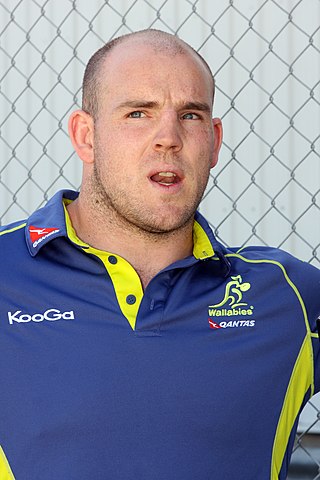
Stephen Thomas Moore is an Australian former rugby union footballer, who played Super Rugby for the Brumbies and Queensland Reds and has 129 caps for Australia internationally, including 24 tests as captain.
The McLean family were an Australian rugby clan who between them played 77 Tests for the Australian national rugby union team and a number of Tests for the Australian national rugby league team.
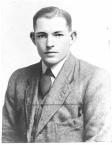
Tom Lawton Snr was an Australian rugby union player, a state and national representative five-eighth who made 44 appearances for the Wallabies, played in 14 Test matches and captained the national side on ten occasions.
The 1984 Australia rugby union tour of Britain and Ireland was a series of eighteen matches played by the Australia national rugby union team in Britain and Ireland between 17 October and 15 December 1984. The Australian team won thirteen matches, drew one and lost four but notably won all four of their international matches.
Colin "Col" Windon, was a rugby union player and soldier who captained Australia – the Wallabies – in two Test matches in 1951. By age 18 Windon was playing at flanker for his club Randwick in Sydney's Shute Shield. After serving with the Second Australian Imperial Force in the Pacific Theatre during the Second World War, Windon resumed his rugby career in 1946. He was first selected for Australia for their tour of New Zealand that year. Despite the Wallabies losing both their Tests on tour, Windon impressed with his play.
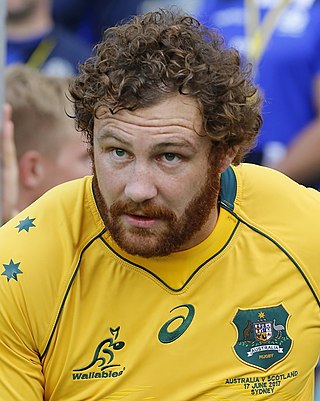
Scott Higginbotham is a retired Australian rugby union player. Capped 32 times for Australia's national team, the Wallabies, Higginbotham's usual positions are blindside flanker and number eight.

Anthony Alexander Shaw is an Australian former rugby union player. A Queensland state and national representative flanker, Shaw captained the national side consistently from 1978 to 1982.
Rugby union was first introduced into Lebanon both by the mandated French forces, and subsequently by the Lebanese returning from the diaspora. Introduced into other parts of the Middle East, by the British military in the mid 20th Century, rugby has begun to develop across the Arabian peninsula with the establishment of many national rugby federations and the development of the Dubai Sevens.
The 1975–76 Australia rugby union tour of Britain and Ireland was a series of matches played by the Australia national rugby union team. The team was referred to as the "Sixth Wallabies", although they were actually only the fifth Australian touring team to undertake a full tour of Britain & Ireland; the "Second Wallabies" of 1939–40 had to return home without playing a game when the World War II broke out.
Desmond Michael Connor is an Australian former rugby union halfback who represented internationally both the Australian and New Zealand national rugby union teams. He is an inductee in the Australian Rugby Union Hall of Fame.
Glen Joseph Ella is a former Australian rugby union player and coach. Ella played as a Fullback for Randwick, Manly and New South Wales. Ella also represented Australia in the 1980s, however, did not play at the first Rugby World Cup in the 1987 Rugby World Cup.
The 1976 Australia rugby union tour of Europe was a series of ten matches played by the Australia national rugby union team in France and Italy in October and November 1976. The Wallabies won four and lost six of their matches; they lost both of their international matches against France in Bordeaux and Paris but won the international against Italy.
The 1996 Australia rugby union tour was a series of rugby union matches played between 19 October and 7 December 1996 in Europe by the Australia national rugby union team.

Peter George Johnson was an Australian international rugby union player. He enjoyed a long state and international career throughout the 1960s and made 92 national appearances for his country. He captained the Australian side in five Test matches.
Geoffrey Arnold Shaw is an Australian former national representative rugby union player who played for and captained the Wallabies. He made state representative appearances for both New South Wales and Queensland over an eleven-year period from 1969.
References
- 1 2 "Gareth Owen Grey". classicwallabies.com.au.
- ↑ "Gary Grey to join Wallabies". The Canberra Times . 12 January 1976. p. 12 – via National Library of Australia.